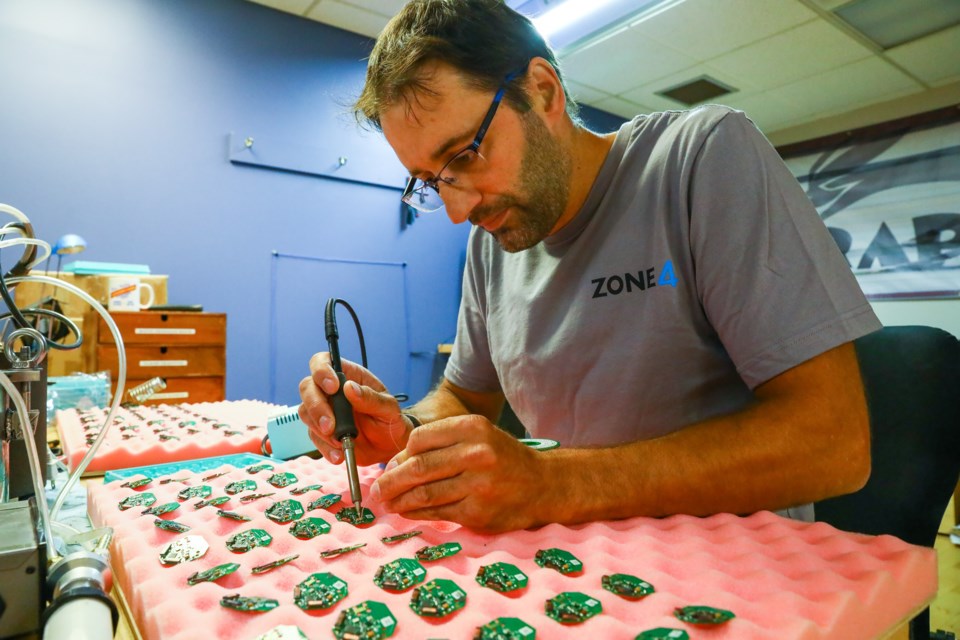CANMORE – One week into the pandemic, Dan Roycroft and his Zone4 race timing business were essentially out of work.
The normal dozen races that needed timing each weekend and the burgeoning motorized sports market in the United States were effectively cancelled as public health restrictions forced cancellations across the world.
“We were just wiped out. We were done. We sat down with everyone and we had no choice and we actually wrote out the termination letters for everybody, including myself, and we only had enough money for one person to just answer phones and emails,” he said of the Canmore-based business. “That was the saddest moment.”
With no races on the horizon and government subsidies not yet ready, the future was bleak.
However, once the Canada Emergency Response Benefit came into effect, it allowed the company to save the majority of its staffing positions and shift focus to a partnership that had been signed in 2019.
“The wage subsidy was to keep people employed and that saved us. It allowed us the opportunity to actually chase this,” Roycroft said. “In the end, it may have been the best thing to have to give us the resources to pivot and be more resourceful in the future.”
The deal with CodeSource – a Texas-based asset management and product identification company – would have Zone4 use its race timing technology for asset management and tracking.
Though different uses, the concepts are similar. In race timing, if you have a 99.9 per cent success rate, it’s still not good enough. As in asset management, everything needs to be logged accurately.
“If you create a technology that’s that good, all of a sudden markets like industrial asset tracking with tracking pallets and trucks, that beats most products on the market. … They really liked what we had developed and wanted to take it to non race timing areas.
“When the pandemic hit and we lost the entire market, we just poured all our resources into this other market and now a year later, races have come back but we’ve launched this product.”
The work sees the company license its IP to CodeSource, which would be the face of the asset management aspect, while Zone4 would continue with race timing.
They first needed to rebuild their product.
Though using cellphones as readers works for racing, when asset management needs to be tracked every hour of each day in the year, a new reader product was needed. It also meant a new operating system, code and user interface.
It wasn’t quite rebuilding the wheel, but they did need time to make it work, Roycroft said.
The first testing was done at the Graymont Exshaw plant by tracking trucks that were on the road for 16 hours a day in -40 Celsius conditions.
“It proved the technology could work in those harsh environments. … It’s been a long road, but their software is now up to par.
“It’s been a fantastic ride. It gave us motivation during the pandemic when nothing else was happening and there was no light at the end of the tunnel.”
Roycroft was on Canada’s national ski team and moved to Canmore after finishing university in 2001. He skied in the 2006 Winter Olympics, but had started Zone 4 having known firsthand the need for quick and reliable race results.
The software was developed from scratch and a shift in 2010 had the company redesign the software to work on more systems and be supported remotely in Canmore. A new chip system was developed in 2014, which Roycroft called a “turning point.”
The technology would create a tiny chip, use bluetooth technology and allow for cellphones to be used as readers for one seamless feature.
“That was a real killer feature because every other system was a hodgepodge of somebody else’s hardware and somebody else’s software,” he said. “They would have all these different layers.”
The more user friendly system allowed the community run organizations without significant money to not have to bring in contract timers and run the races themselves.
“The idea was to take something that’s really hard and make it really easy," he said. "Once we had that point, we really hit our stride once the chip got mature by 2016 and software was mature by 2017, 2018, we really hit out stride and sales really took off.”
The priority for Zone4 will continue to be race timing, Roycroft said, noting a deal was signed with Red Bull Canada to have chip systems installed at downhill resorts to keep track of fastest times down a hill and other fun events at ski hills.
However, by partnering with asset management, it ensures a healthy and strong company.
Though it’s only entering its infancy, as the marketing campaign has been launched and pilot projects completed, Roycroft said he’s confident it will bring continued success to Zone4.
“I’m quite certain longterm this will be far bigger than the race timing side because of the way the markets work. All we need is a few big customers and they’ll have dwarfed any race we’ve run. There’s no guarantee it’s successful, but we’ve hitched our wagon to the best possible car. If they succeed, we’ll succeed.”




